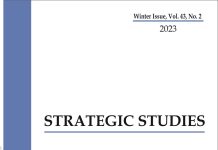Abstract
Pak-Afghan relations in post-Taliban era are a narration of mistrust and a display of the Prisoner’s Dilemma. Despite Pakistan’s efforts to maintain good neighbourly relations, it is being blamed for chaotic situation in Afghanistan, providing safe havens for miscreants in FATA, sponsoring terrorism and suicide bombing in the latter. On the other hand, Pakistan is also suspicious of Afghanistan’s India-centric policies, which results in insurgency and unrest in FATA, Balochistan and different parts of the country. Despite several commonalities and both being allies in the war against terrorism, the trust gap however is so broad that both the countries cannot decipher their disagreements bilaterally. Resultantly, both have become a recipe of never ending violence and allowing regional powers to interfere in their affairs and exploit the situation to their own advantage. Pak-Afghan relations cannot afford mistrust and hostility, which has repeatedly caused negative repercussions on their relations. The paper employs Prisoner’s Dilemma approach to examine the nature of Pak-Afghan relations and draw a conclusion for trust building via its repeated reciprocal strategies. In addition, the theoretical framework explains that reciprocal strategies, if adopted, will enable Pakistan and Afghanistan to break Prisoner’s Dilemma, sustain trust and convert their limited cooperation into full cooperation based on mutual trust.













